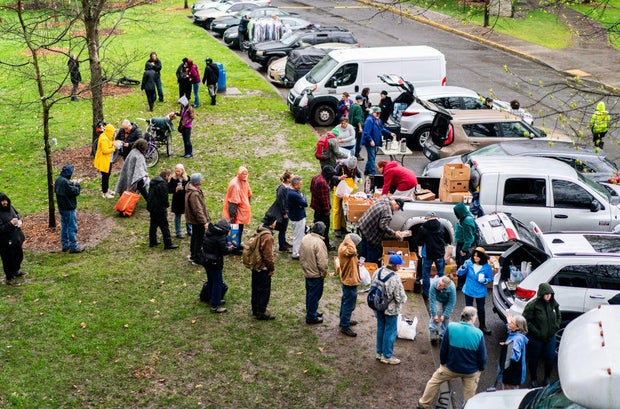The 6-3 decision from the courtroom within the case often known as City of Grants Pass v. Johnson is its most vital involving homelessness in a long time. It comes as cities nationwide grapple with a spike within the variety of individuals with out entry to shelter, pushed partly by excessive housing prices and the top of support applications launched in response to the COVID-19 pandemic.
The ruling is more likely to clear the best way for state and native officers to mete out civil punishments in an effort to curtail homeless encampments, which have unfold all through the West on account of a federal appeals courtroom resolution within the case involving anti-camping ordinances from Grants Pass, Oregon.
Quite a few state and native leaders throughout occasion strains have defended tenting bans as essential for safeguarding public well being and security, however the U.S. Court of Appeals for the ninth Circuit discovered legal guidelines imposing civil penalties on homeless individuals for sleeping exterior after they have nowhere else to go are unconstitutional.
The Supreme Court reversed that call, concluding that the enforcement of legal guidelines regulating tenting on public property doesn’t represent merciless and strange punishment below the Eighth Amendment.
The struggle in Grants Pass
Homelessness rose 12% nationwide from 2022 to 2023, in accordance with the Department of Housing and Urban Development, and on any given evening final yr, there have been an estimated 256,000 unsheltered individuals within the U.S.
In Grants Pass, a metropolis of roughly 40,000 situated in southern Oregon, there are an estimated 600 homeless individuals. In 2013, native officers determined to ramp up enforcement of ordinances that prohibit sleeping or tenting on public property or in metropolis parks.
Melina Mara/The Washington Post through Getty Images
Violators face fines beginning at $295, and repeat offenders could also be banned from a metropolis park for 30 days. If an individual violates that order by tenting in a park, they’re topic to legal trespass costs, punishable by as much as 30 days in jail and a $1,250 high quality. According to the town, greater than 500 citations had been issued from 2013 to 2018 for violations of the anti-camping ordinances.
In 2018, three homeless individuals in Grants Pass filed a lawsuit in opposition to the town on behalf of its homeless inhabitants, alleging that its guidelines violate the Eighth Amendment’s prohibition on merciless and strange punishment.
The challengers prevailed earlier than a federal district courtroom, which blocked Grants Pass from imposing its public tenting ban throughout nighttime hours, and throughout the daytime until it gave 24 hours discover.
A divided panel of three judges on the ninth Circuit upheld the district courtroom’s resolution, discovering that Grants Pass could not implement its anti-camping ordinances in opposition to homeless individuals merely for sleeping exterior with safety from the weather after they have nowhere else within the metropolis to go. A full slate of ninth Circuit judges declined to rehear the case.
The Supreme Court heard arguments in April. The justices appeared to acknowledge the challenges with how greatest to handle homelessness, however a number of urged that these selections had been higher left to policymakers, not judges.
The case attracted enter from a spread of advocacy teams, native and state officers, regulation enforcement teams and the federal authorities.
Leaders of main cities like Phoenix and Los Angeles, in addition to the state of California, warned in opposition to limiting their skill to reply to homeless individuals sleeping in public areas, together with by clearing encampments or imposing their guidelines in opposition to public tenting.









































